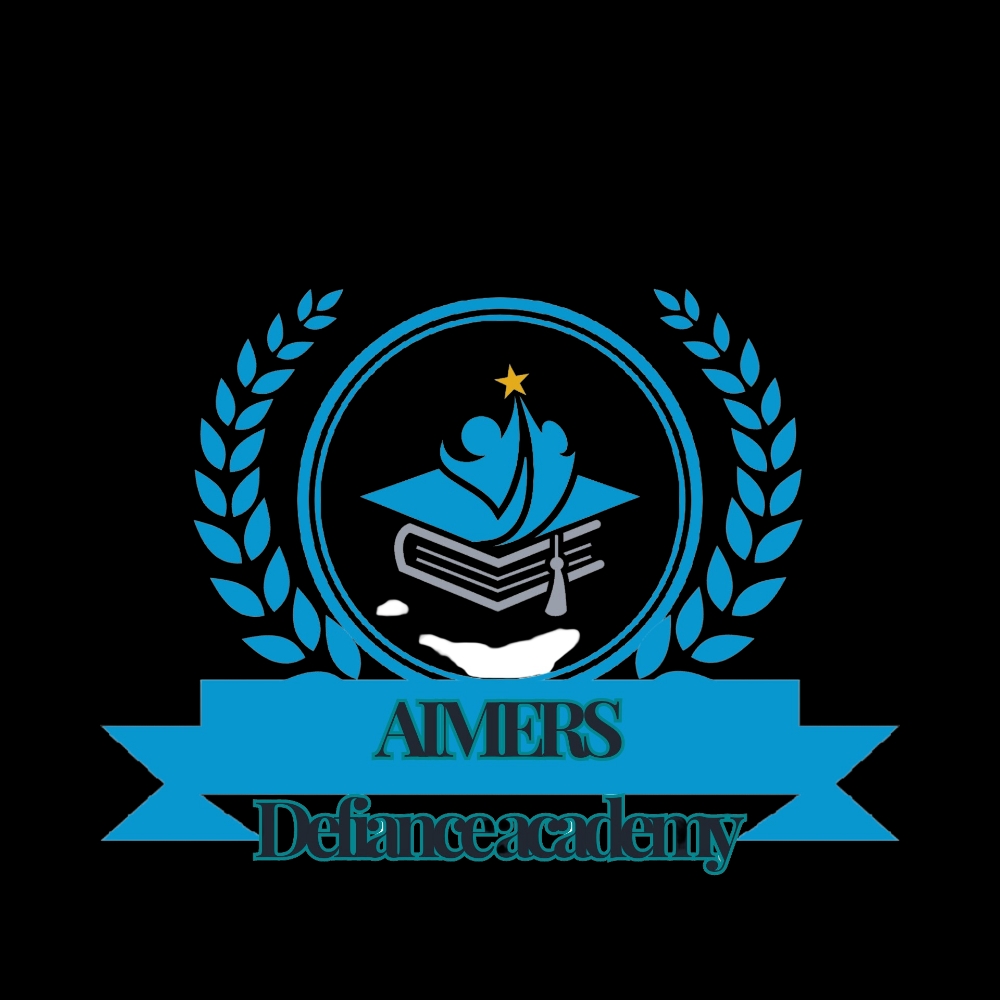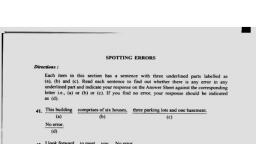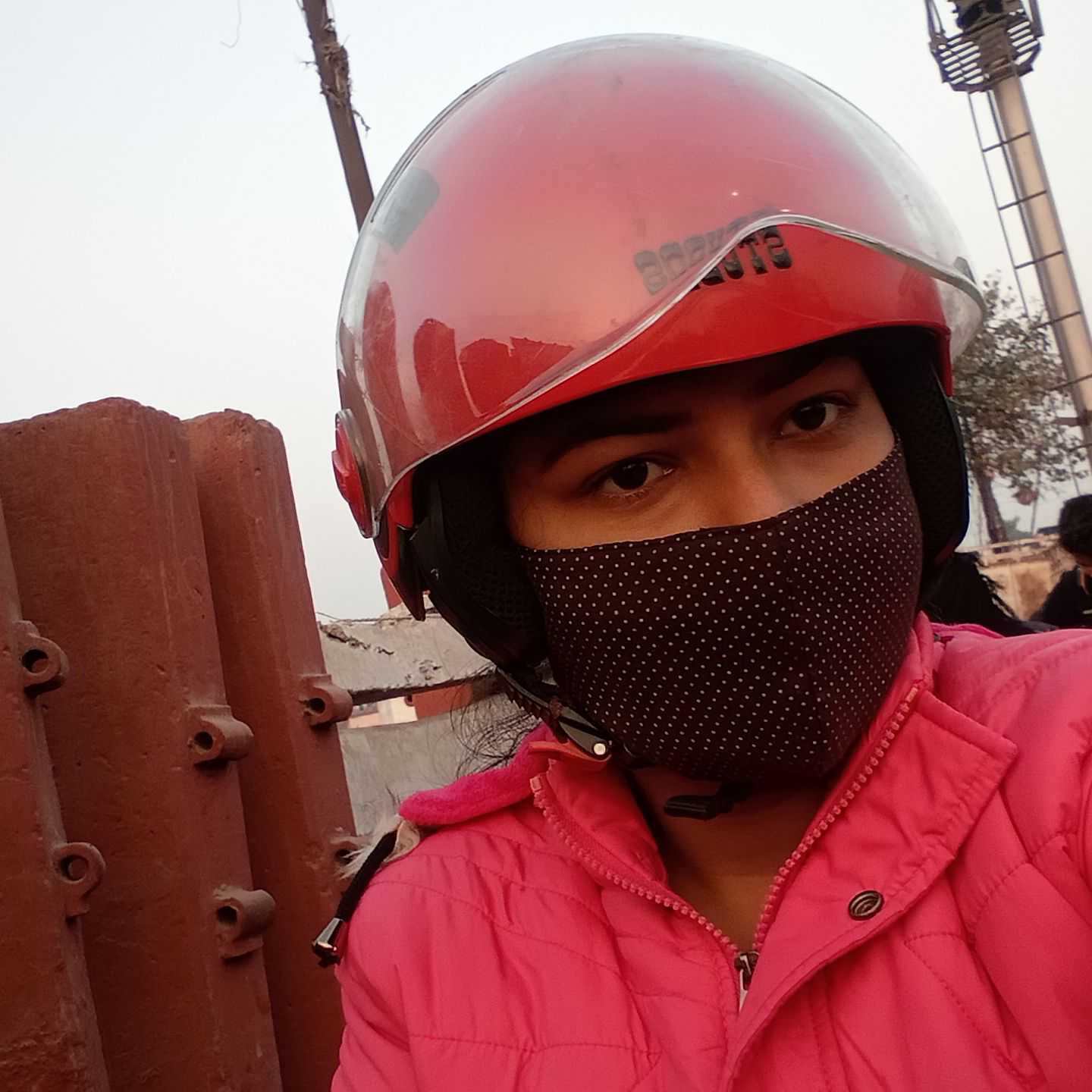Question 1 :
<b> In the following question, some part of the sentence may have errors. Find out which part of the sentence has an error and select the appropriate option. If a sentence is free from error, select 'No Error'. </b> <br>Though he is very (A)/ wealthy and powerful he has any (B)/ concern for the poor. (C)/No error (D). <br>
Question 2 :
<b>Read the following passage carefully and choose the most appropriate answer to the question out of the four alternatives. </b> <br> The habit of reading is one of the greatest resources of mankind; and we enjoy reading books that belong, to us much more than if they are borrowed. A borrowed book is like a guest in the house; it must be treated with punctiliousness, with certain considerate formality. You must see that sustains no damage; it must not suffer while under your roof. You cannot leave it carelessly, you cannot mark it, you cannot turn down the pages, cannot use it familiarly. <br> But your own books belong to you; you treat them with that affectionate intimacy that annihilates formality. <br> Books are for use not for show. A good reason for marking favourite pages in books is that this practice enables you to remember more easily the significant sayings, to refer to them quickly. Everyone should begin collecting a private library in youth; one should have one’s own book-shelves, which should not have doors, glass windows, or keys; they should be free and accessible to the hand as well as to the eye. Books are of the people, by the people and for the people. Literature is an immortal part of history; it is the best and most enduring part of personality. <br>According to the passage, a borrowed book is like a <br>
Question 3 :
<b>Each of the following items has a sentence with a blank space and four words or group of words given after the sentence. Select whichever word or group of words you consider most appropriate for the blank space and indicate your response.</b> <br>It is advisable to ______________sweets and junk food in order to stay healthy.
Question 4 :
<b> Read the following passage carefully and choose the most appropriate answer to the question out of the four alternatives.</b> <br> A guest speaker was addressing the faculty and the students in the college auditorium. I had joined the faculty the year before, and was already drawing attention. I was 27, full of assumptions about myself, quick with a comment on everything, and expected people to pay attention to all that I had said. <br> I listened to the talk for the first five minutes. By the seventh, I was looking around to check if others were listening. By the tenth, I had glanced at my watch three times, and yawned once. After twenty minutes I was thoroughly bored, and telling myself that it was difficult to sit through such an insipid talk. I wanted to share some of my expert comments with my neighbour. But he was completely sold out to the speaker, and looked like it was the greatest day of his life. I was disgusted. I tried to catch a word or phrase from the talk, only to convince myself that this should be his last talk ever. <br> The one-hour talk took ages to end, and before the thanks were said, I jumped to my feet with a sigh of relief. My neighbour smiled at me and said, "The talk was wonderful, wasn't it?" I retorted, "It almost killed me with kindness". <br>How did the narrator respond to the speech? <br>
Question 5 :
<b> In this section, look at the bold part of each sentence. Below each sentence are given three possible substitutions for the bold part. If one of them (A),(B) or (C) is better than the bold part, indicate your response against (A),(B)or (C). If none of the substitutions improves the sentence, indicate (D) as your response. Thus, a No improvement response will be signified by the letter (D).</b> <br>I walked back home after the movie <b>yesterday night.</b>
Question 6 :
<b> Read the following passage carefully and choose the most appropriate answer to the question out of the four alternatives. </b> <br> Learning is the knowledge of that which is not generally known to others, and which we can only derive at second-hand from books or other artificial sources. The knowledge of that which is before us, or about us, which appeals to our experience, passions, and pursuits, to the bosoms and businesses of men, is not learning. Learning is the knowledge of that which none but the learned know. He is the most learned man who knows the most of what is farthest removed from common life and actual observation. The learned man prides himself in the knowledge of names, and dates, not of men or things. He thinks and cares nothing about his next-door neighbours, but he is deeply read in the tribes and castes of the Hindoos and Calmuc Tartars. He can hardly find his way into the next street, though he is acquainted with the exact dimensions of Constantinople and Peking. He does not know whether his oldest acquaintance is a knave or a fool, but he can pronounce a pompous lecture on all the principal characters in history. He cannot tell whether an object is black or white, round or square, and yet he is a professed master of the optics and the rules of perspective. <br>Learning is defined as <br>
Question 7 :
<b> In the following question, some part of the sentence may have errors. Find out which part of the sentence has an error and select the appropriate option. If a sentence is free from error, select 'No Error'. </b> <br>Majority of the banks (A)/ today uses technology (B)/ to reach out to those living in rural areas. (C)/No error (D). <br>
Question 8 :
<b> Read the following passage carefully and choose the most appropriate answer to the question out of the four alternatives.</b> <br> A guest speaker was addressing the faculty and the students in the college auditorium. I had joined the faculty the year before, and was already drawing attention. I was 27, full of assumptions about myself, quick with a comment on everything, and expected people to pay attention to all that I had said. <br> I listened to the talk for the first five minutes. By the seventh, I was looking around to check if others were listening. By the tenth, I had glanced at my watch three times, and yawned once. After twenty minutes I was thoroughly bored, and telling myself that it was difficult to sit through such an insipid talk. I wanted to share some of my expert comments with my neighbour. But he was completely sold out to the speaker, and looked like it was the greatest day of his life. I was disgusted. I tried to catch a word or phrase from the talk, only to convince myself that this should be his last talk ever. <br> The one-hour talk took ages to end, and before the thanks were said, I jumped to my feet with a sigh of relief. My neighbour smiled at me and said, "The talk was wonderful, wasn't it?" I retorted, "It almost killed me with kindness". <br>What do you understand about the narrator from the description in the first paragraph? <br>
Question 9 :
<b> In this section, each item consists of a sentence with a word underlined and is followed by four words. Select the word that is most opposite in meaning to the underlined words and indicate your response.</b> <br>He was <b>befogged</b> due to lack of proper sleep <b>. </b>
Question 10 :
<b> In this section, look at the underlined part of each sentence. Below each sentence are given three possible substitutions for the underlined part. If one of them (A),(B) or (C) is better than the underlined part, indicate your response against (A),(B) or (C). If none of the substitutions improves the sentence, indicate (D) as your response. Thus a No improvement response will be signified by the letter (D)</b> <br>While crossing the road, <b>a snake was seen.</b>
Question 11 :
<b> In this section, each item consists of a sentence with a word bold and is followed by four words or groups of words, Select the word or group of words that is most similar in meaning to the bold word and indicate your response.</b> <br>A <b>chauvinist</b> is someone who is so aggressive in their beliefs that they will berate or antagonize you for not agreeing with them.
Question 12 :
<b>In the following question, some part of the sentence may have errors. Find out which part of the sentence has an error and select the appropriate option. If a sentence is free from error, select 'No Error'. </b> <br>Under no circumstances (A)/ have I harmed (B)/ him, and he knows. (C)/ No Error. (D) <br>
Question 13 :
<b>Each of the following items has a sentence with a blank space and four words or group of words given after the sentence. Select whichever word or group of words you consider most appropriate for the blank space and indicate your response on the Answer Sheet accordingly.</b> <br>Instead of showing his mother his paper, the boy chose to _______ it up.
Question 14 :
<b> In this section, each item consists of a sentence with a word underlined and is followed by four words. Select the word that is most opposite in meaning to the underlined words and indicate your response.</b> <br>The boss <b>beckoned</b> to all the employees in the meeting <b>.</b>
Question 15 :
<b> In the following question the 1st and the last part of the sentence/passage are numbered 1 and 6. The rest of the sentence/ passage is split into four parts and named P, Q, R and S. These four parts are not given in their proper order. Read the sentence/passage and find out which of the four combinations is correct.</b> <br>1. Some of the other patrons are even more of a problem than the theatre itself. <br> P. They make noises and create disturbances at their seats. <br> Q. Some act as if they were at home in their own living room watching the TV set. <br> R. People are often messy, so that you're constantly aware of all the food they're eating. <br> S. Many people in the theatre often show themselves to be inconsiderate. <br> 6. People are also always moving around near you, creating a disturbance and interrupting your enjoyment of the movie.
Question 16 :
<b>In this section, look at the underlined part of each sentence. Below each sentence are given three possible substitutions for the underlined part. If one of them (A),(B) or (C) is better than the underlined part, indicate your response against (A),(B)or (C). If none of the substitutions improves the sentence, indicate (D) as your response. Thus a No improvement response will be signified by the letter (D).</b> <br>A budget <b>should have to mould </b>by the needs of a nation.
Question 17 :
<b>Each of the following items has a sentence with a blank space and four words or group of words given after the sentence. Select whichever word or group of words you consider most appropriate for the blank space and indicate your response on the Answer Sheet accordingly.</b> <br>All I need is a ___________ of money to pay for my basic needs.
Question 18 :
<b> Read the following passage carefully and choose the most appropriate answer to the question out of the four alternatives</b> <br> Is there any difference between "genius" and "talent”? We generally feel that a man of genius is in some way higher than a man of talent; and that talented men are more common than genius. This is true, but it is rather vague. Genius implies "very extraordinary gifts or native powers, especially as displayed in original creation, discovery, expression or achievement; phenomenal capacity regarded as relatively independent of instruction and training". Talent, on the other hand, consists of "mental endowments or capacities of superior character; marked mental ability". "Talent" is more the capacity to learn to do a thing well; but "genius" is an inborn inspiration that drives a man to do a thing with original excellence. As Meredith said, "Genius does what it must, and talent does what it can". <br> Shakespeare in drama and poetry, Isaac Newton in science, Napoleon in war, Beethoven in music, were geniuses; many well-known poets, scientists, generals and musicians have been men of talent. <br>A genius is a man with _________ ideas. <br>
Question 19 :
<b>Each of the following items has a sentence with a blank space and four words or group of words given after the sentence. Select whichever word or group of words you consider most appropriate for the blank space and indicate your response on the Answer Sheet accordingly.</b> <br>When the lawyer accused the priest of __________ he shocked everyone in the courtroom.
Question 20 :
<b> In this section, each item consists of a sentence with a word bold and is followed by four words. Select the word that is most opposite in meaning to the bold words and indicate your response accordingly.</b> <br>Her voice was weak and <b>tremulous</b>, but the audience clapped politely when she finished the aria
Question 21 :
<b> In this section, each item consists of a sentence with a word bold and is followed by four words. Select the word that is most opposite in meaning to the bold words and indicate your response in the Answer Sheet accordingly.</b> <br>The celebrity cut in front of me like I was a <b>nonentity</b>.
Question 22 :
<b>In the following question, some part of the sentence may have errors. Find out which part of the sentence has an error and select the appropriate option. If a sentence is free from error, select 'No Error'. </b> <br>He lent me some money on the condition (A)/ that I should return the same (B)/before November. (C)/No Error (D) <br>
Question 23 :
<b>Each of the following items has a sentence with a blank space and four words or group of words given after the sentence. Select whichever word or group of words you consider most appropriate for the blank space and indicate your response.</b> <br>The brilliant runner ___________________to third place when he fell on the ground during the race.
Question 24 :
<b>In this section, look at the underlined part of each sentence. Below each sentence are given three possible substitutions for the underlined part. If one of them (A),(B) or (C) is better than the underlined part, indicate your response against (A),(B)or (C). If none of the substitutions improves the sentence, indicate (D) as your response. Thus a No improvement response will be signified by the letter (D).</b> <br>The option <b>living with us</b> is to make the payment and keep quiet.
Question 25 :
<b> In this section, look at the underlined part of each sentence. Below each sentence are given three possible substitutions for the underlined part. If one of them (A),(B) or (C) is better than the underlined part, indicate your response against (A),(B) or (C). If none of the substitutions improves the sentence, indicate (D) as your response. Thus a No improvement response will be signified by the letter (D)</b> <br>After the heavy rains last week, the water in the lake <b> raised another two feet.</b>
Question 26 :
<b> In this section, each item consists of a sentence with a word bold and is followed by four words or groups of words, Select the word or group of words that is most similar in meaning to the bold word and indicate your response</b>. <br>He was <b> livid</b> that grey had escaped.
Question 27 :
<b>Each of the following items has a sentence with a blank space and four words or group of words given after the sentence. Select whichever word or group of words you consider most appropriate for the blank space and indicate your response on the Answer Sheet accordingly.</b> <br>I only have a ___________of respect for her after she lied about her background
Question 28 :
<b> Each of the following items has a sentence with a blank space and four words or group of words given after the sentence. Select whichever word or group of words you consider most appropriate for the blank space and indicate your Answer accordingly. </b> <br>The elephant stampeded and tore ………the streets.
Question 29 :
<b> In the following question the 1st and the last part of the sentence/passage are numbered 1 and 6. The rest of the sentence/ passage is split into four parts and named P, Q, R and S. These four parts are not given in their proper order. Read the sentence/passage and find out which of the four combinations is correct.</b> <br>1. Love is one of the earliest of human passions. <br> P. It is also one of the sweetest. <br> Q. Love should be directed towards a worthy object. <br> R. But, like all strong passions it may, if not well regulated and controlled, lead us into misery. <br> S. Or it will prove in the end a source of bitterness. <br> 6. Love, moreover, looks forward to reciprocation.
Question 30 :
<b>Each of the following items has a sentence with a blank space and four words or group of words given after the sentence. Select whichever word or group of words you consider most appropriate for the blank space and indicate your response on the Answer Sheet accordingly.</b> <br>The records give us an__________ of how people saw the world.
Question 31 :
<b>In this section, look at the underlined part of each sentence. Below each sentence are given three possible substitutions for the underlined part. If one of them (A),(B) or (C) is better than the underlined part, indicate your response against (A),(B)or (C). If none of the substitutions improves the sentence, indicate (D) as your response. Thus a No improvement response will be signified by the letter (D).</b> <br>Sita was cooking in the kitchen when her husband <b>was ringing</b> the bell.
Question 32 :
<b>In the following question the 1st and the last part of the sentence/passage are numbered 1 and 6. The rest of the sentence/ passage is split into four parts and named P, Q, R and S. These four parts are not given in their proper order. Read the sentence/passage and find out which of the four combinations is correct.</b> <br>1.Indiscriminate industrialization resulted <br> P. as the rural <br> Q. in cities in search <br> R. in urban migration <br> S. poor settled <br> 6. of opportunities. <br>
Question 33 :
In <b> the following question the 1st and the last part of the sentence/passage are numbered 1 and 6. The rest of the sentence/ passage is split into four parts and named P, Q, R and S. These four parts are not given in their proper order. Read the sentence/passage and find out which of the four combinations is correct.</b> <br>1.Osteoarthritis in the knee is a problem that affects millions of people. <br> P. And so it reduces disability and improves quality of life. <br> Q. Due to muscle flexibility there is less pain. <br> R. Knee exercises are done sitting in a chair or lying on one's back. <br> S. Knee exercises help prevent joint stiffness and strengthen muscles around the joint. <br> 6. Exercises that help thigh muscles without involving weight bearing are safe and effective. <br>
Question 34 :
<b>In the following question, some part of the sentence may have errors. Find out which part of the sentence has an error and select the appropriate option. If a sentence is free from error, select 'No Error'. </b> <br>I don’t appreciate (A)/those who laugh (B)/at others without any apparent reason. (C)/ No Error. (D) <br>
Question 35 :
<b> In the following question, some part of the sentence may have errors. Find out which part of the sentence has an error and select the appropriate option. If a sentence is free from error, select 'No Error'. </b> <br>Wholesome strategic planning was the focus as (A)/ the firm manage through a difficult period (B)/ a couple of years ago.(C)/No error(D).
Question 36 :
<b>Each of the following items has a sentence with a blank space and four words or group of words given after the sentence. Select whichever word or group of words you consider most appropriate for the blank space and indicate your response.</b> <br>The student ________________the professor for doubts in the assignment sheet.
Question 37 :
<b>In this section, each item consists of a sentence wih a word underlined and is followed by four words or groups of words, Select the word or group of words that is most similar in meaning to the underlined word and indicate your response.</b> <br>Raman is the <b>minion</b> at work who obeys whatever his boss says.
Question 38 :
<b> In this section, look at the underlined part of each sentence. Below each sentence are given three possible substitutions for the underlined part. If one of them (A),(B) or (C) is better than the underlined part, indicate your response against (A),(B) or (C). If none of the substitutions improves the sentence, indicate (D) as your response. Thus a No improvement response will be signified by the letter (D)</b> <br>If I had gone to Mumbai, <b>I would surely bring</b> your books.
Question 39 :
<b>Each of the following items has a sentence with a blank space and four words or group of words given after the sentence. Select whichever word or group of words you consider most appropriate for the blank space and indicate your response on the Answer Sheet accordingly.</b> <br>The ……………of a dynasty has been found in an architecture excavation
Question 40 :
<b> Read the following passage carefully and choose the most appropriate answer to the question out of the four alternatives. </b> <br> Learning is the knowledge of that which is not generally known to others, and which we can only derive at second-hand from books or other artificial sources. The knowledge of that which is before us, or about us, which appeals to our experience, passions, and pursuits, to the bosoms and businesses of men, is not learning. Learning is the knowledge of that which none but the learned know. He is the most learned man who knows the most of what is farthest removed from common life and actual observation. The learned man prides himself in the knowledge of names, and dates, not of men or things. He thinks and cares nothing about his next-door neighbours, but he is deeply read in the tribes and castes of the Hindoos and Calmuc Tartars. He can hardly find his way into the next street, though he is acquainted with the exact dimensions of Constantinople and Peking. He does not know whether his oldest acquaintance is a knave or a fool, but he can pronounce a pompous lecture on all the principal characters in history. He cannot tell whether an object is black or white, round or square, and yet he is a professed master of the optics and the rules of perspective. <br>The most learned man is he who <br>
Question 41 :
<b> Each of the following items has a sentence with a blank space and four words or group of words given after the sentence. Select whichever word or group of words you consider most appropriate for the blank space and indicate your Answer accordingly. </b> <br> Don’t loiter……. the corridor.
Question 42 :
<b> In the following question, some part of the sentence may have errors. Find out which part of the sentence has an error and select the appropriate option. If a sentence is free from error, select 'No Error'. </b> <br>Inspite of the best governmental efforts, (A)/ emission of green-house gases (B)/ and noxious chemicals remain a cause of worry.(C)/No error (D).
Question 43 :
<b> Each of the following items has a sentence with a blank space and four words or group of words given after the sentence. Select whichever word or group of words you consider most appropriate for the blank space and indicate your Answer accordingly. </b> <br>Shalini was not .......... by the criticism and paid no attention even when her best friend talked against her.
Question 44 :
<b> In this section, look at the bold part of each sentence. Below each sentence are given three possible substitutions for the bold part. If one of them (A),(B) or (C) is better than the bold part, indicate your response against (A),(B)or (C). If none of the substitutions improves the sentence, indicate (D) as your response. Thus, a No improvement response will be signified by the letter (D).</b> <br><b> Because that there were </b>heavy rains the lake was flooded.
Question 45 :
<b>In this section, look at the underlined part of each sentence. Below each sentence are given three possible substitutions for the underlined part. If one of them (A),(B) or (C) is better than the underlined part, indicate your response against (A),(B)or (C). If none of the substitutions improves the sentence, indicate (D) as your response. Thus a No improvement response will be signified by the letter (D).</b> <br>Please report to me when <b>you return back from </b>Delhi.
Question 46 :
<b>In the following question the 1st and the last part of the sentence/passage are numbered 1 and 6. The rest of the sentence/ passage is split into four parts and named P, Q, R and S. These four parts are not given in their proper order. Read the sentence/passage and find out which of the four combinations is correct.</b> <br>1. Computers and mobile phones <br> P. grammar and reducing <br> Q. are turning us into <br> R. lazy writers <br> S. ruining our spelling and <br> 6. our attention span. <br>
Question 47 :
In <b> the following question the 1st and the last part of the sentence/passage are numbered 1 and 6. The rest of the sentence/ passage is split into four parts and named P, Q, R and S. These four parts are not given in their proper order. Read the sentence/passage and find out which of the four combinations is correct.</b> <br>1.The salmon fish pushed themselves <br> P. to return to their spawning grounds <br> Q. and fertilized them <br> R. but once they laid their eggs <br> S. to their limits <br> 6. they died. <br>
Question 48 :
In <b> the following question the 1st and the last part of the sentence/passage are numbered 1 and 6. The rest of the sentence/ passage is split into four parts and named P, Q, R and S. These four parts are not given in their proper order. Read the sentence/passage and find out which of the four combinations is correct.</b> <br>1. One reason for studying Psychology is to help you deal with your children. <br> P. Offer her a choice of staying up till 7:30 with you or going upstairs and playing until 8:00. <br> Q. A little knowledge of Psychology comes in handy. <br> R. Since she gets to make the choice, she does not feel so powerless and will not resist. <br> S. Perhaps your daughter refuses to go to bed when you want her to and bursts into tears at the mention of lights out. <br> 6. Psychology is also useful in rewarding a child for a job well done. <br>
Question 49 :
<b>In the following question, some part of the sentence may have errors. Find out which part of the sentence has an error and select the appropriate option. If a sentence is free from error, select 'No Error'. </b> <br>The beggar (A)/ whom we had suspected (B)/ to be guilty turned out to be innocent. (C)/ No Error. (D) <br>
Question 50 :
<b>In the following question the 1st and the last part of the sentence/passage are numbered 1 and 6. The rest of the sentence/ passage is split into four parts and named P, Q, R and S. These four parts are not given in their proper order. Read the sentence/passage and find out which of the four combinations is correct.</b> <br>1. Greed is regarded as <br> P. possible ruinous and <br> Q. because it has <br> R. destructive effects <br> S. immoral behavior <br> 6. on the other people. <br>



























